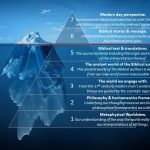Philosophy
THE UNAVOIDABLE FRIEND
YOU HAD ALL ALONG
Published on October 1, 2020
by Louise Mabille
For many, philosophy is like the kid from the wrong side of town your parents warned you against: strange, speaking a kind of language beyond the cozy familiar world we call the comfort zone. Some fear that it has the ability to upset the apple cart of the truths they live by, and others blame philosophy for the liberal trend in contemporary theology – ‘isn’t truth just a construct?’
It may therefore come as quite the surprise that everyone – literally everyone – engages in philosophy at decisive – and not only decisive moments – points in their lives. As soon as one makes a distinction between truth and falsehood, distinguish between beautiful and ugly, or rage against the evils that render havoc with human lives, one engages in some degree of philosophy, because it is impossible to do any of these things without assuming, or falling back upon, a common understanding of these ideas. Even in rejecting philosophy as a dangerous subject one tacitly makes a distinction between a) what one considers to be true and important and b) what one considers false or trivial. This means that philosophy is a kind of meta-activity: it involves the most fundamental level on which one can operate.
Of course, very few people have the luxury of enough free time to study these ideas formally, let alone full time. In the formal sense of the word philosophy is the study of the fundamental nature of knowledge, reality, and existence, especially when considered as an academic discipline. As such, it concerns itself with matters like truth, objectivity, how knowledge is formed, the nature of beauty and goodness. However, we engage in philosophical ideas whenever we deal with real-life matters like love (everyone who has ever been in love, every poet or pop artist who wondered what love is, is a philosopher too) or money (who has not wondered about the possibility of a better, fairer world?) Even those who have deliberately chosen to avoid philosophy at university or college level have done so in vain! Every conceivable subject offered by any university from anthropology (what do we mean by ‘culture’?) to zoology (Darwin anyone?) rests upon the ur-subject, philosophy. In fact, most first year study guides are quite explicit about it: put together the theory of all the other subjects and you will start to form some idea what philosophy is. It is everywhere!
Despite being an important part of most theology curricula, it is among theology students that philosophy tends to be treated like an unwanted stepchild: many believers think that they have no need of it, and many fashionably atheistic theology professors think that they already qualify for the title of ‘philosopher’ simply by virtue of their unbelief. At CoreIdeas you will find things are not this simple: while it is fine to touch upon philosophy while just living your life, there is a unique and distinct joy in learning to do philosophy well, and to discover that many of the things you wondered about also concerned the greatest minds that ever lived. You may even discover an answer or two along the way, or at least see things from a more advanced perspective. But perhaps the greatest reward possible is to find that there are truly good reasons for believing as you always have, and that the great truths you hold to be sacred, are indeed that: great truths whose value can only be bolstered by your questioning. Far too many people are secretly afraid that the truths closest to their hearts is something fragile, something to be protected from the harsh scrutiny of rational analysis. But what this attitude really reveals is their own lack of faith, or their lack of genuine trust in the truths they claim as foundational to their lives. Sadly, such people fail to do justice to either themselves or the content of their faith. Just as we show elsewhere that the ancient world was anything but primitive and backwards, at CoreIdeas it will be demonstrated that there is no radical opposition between Biblical truth and other forms of truth.
For the believing reader, we can say without reservation that philosophy can be the greatest ally they will ever have, helping them to see that the truth is even truer than they thought. And philosophy does not stand in opposition to the Bible: it is in the Bible! Both Proverbs and Ecclesiastics are in essence philosophy books. It is implied in the injunction to love God ‘all your mind’ (Matt. 22:37 and Luk. 10:27). In Acts 17 Paul, himself born in Tarsus, a prime seat of Stoicism, gives an excellent example of using reason to bridge the gap between the Gospel and the pagan world he is trying to reach.
It should be remembered however, that philosophy, not unlike say, medicine, is an immense subject. And like medicine, it should be properly approached. But it does not mean that only doctors can lead healthy, balanced lives. Anybody can, just as anybody can pursue wisdom, apply reason, and reach for beauty. This is what we are going to do at CoreIdeas, and our approach will be informed among others, by hermeneutical tradition in philosophy. That is to say, from the onset we are going to eschew subjectivism and relativism, as well as overly simplistic interpretative methods, and our approach will testify to a healthy respect for the tradition. Along with Hans-Georg Gadamer, we embrace a dialogical model of interpretation, holding that a genuine encounter with the past is possible, just as it is possible to find truth. It just takes a little effort… Aside from revisiting ancient friends like Socrates, Plato and Aristotle, we are going introduce you to thinkers like Kant, Hegel, Nietzsche and some twentieth century and even contemporary thinkers who are not half as intimidating as they sound. Occasionally, we may even throw in a theologian or scientist – real wisdom does not come in easily demarcated packages. As the great Immanuel Kant once said, Science is organized knowledge, but wisdom is organized life. We are going to do our part in making the organization a little easier.
Louise Mabille is a researcher currently attached to the Faculty of Theology at the NorthWest University (NWU) at Potchefstroom. She holds a PhD in philosophy from the University Pretoria (on Nietzsche’s notion of justice). She was an Erasmus scholar and completed a second PhD on Milton and the modern notion of free speech at the University of Hull, Yorkshire.




